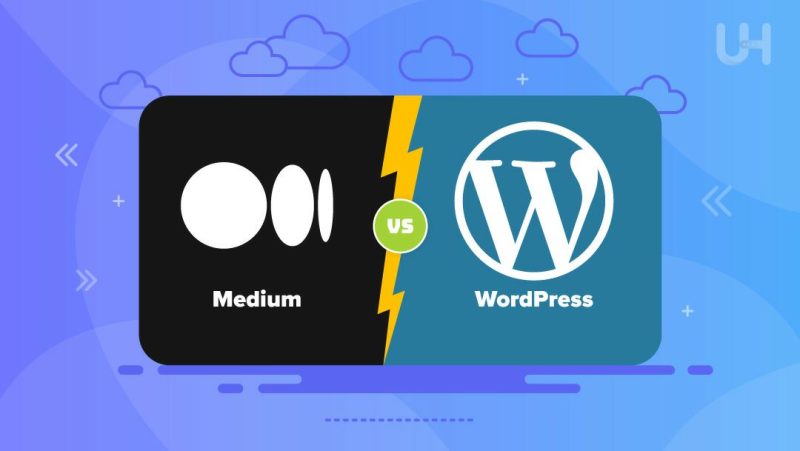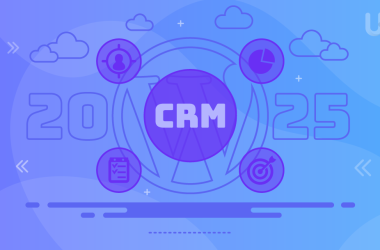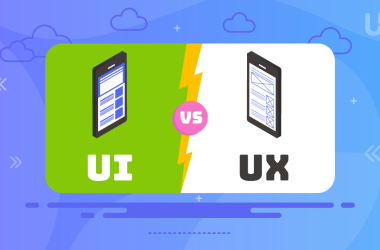Imagine you’re picking a stage for your online diary, and it’s a big deal! The stage is like the place where you create and showcase your content. It decides how easy it is for people to find your stuff, how your blog looks, and even if you can make money from it. Whether you’re just starting out or you’ve been at it for a while, choosing the right platform is crucial—or in other words choosing between Medium vs WordPress is crucial.
You most probably know already that there are two popular places to set up your blog: Medium and WordPress. Think of Medium as the easygoing spot with a simple setup and lots of people ready to discover your stories. On the other hand, WordPress is like the DIY (do it yourself) place, where you have total control over how your blog looks and works. Each has its own style. As we compare these options, it’s all about figuring out which one suits your blogging style and goals the best.
Medium: Overview
Medium has become a popular choice among bloggers due to its user-friendly interface, making it accessible for both beginners and experienced writers. The platform prides itself on simplicity, providing a clean and straightforward environment for content creation. The writing experience on Medium is streamlined, allowing users to focus on expressing their thoughts without being overwhelmed by intricate design elements or technical complexities.
One of the notable features of Medium is its built-in audience. Unlike starting from scratch on your own blog, Medium offers a platform where your content can reach readers more easily. This built-in audience can be a significant advantage, especially for those looking to grow their readership without extensive marketing efforts.
However, potential drawbacks include limited customization options, as Medium aims to maintain a consistent and clean aesthetic across its platform. Users may also face challenges related to the lack of full ownership and control over their content, as well as potential difficulties in monetizing their work compared to other platforms with better monetization options.
WordPress: Overview
WordPress stands as a versatile and widely used platform, offering users unparalleled control and ownership over their content. With its robust content management system, WordPress provides a powerful toolkit for bloggers who value customization. Users can shape their websites to their liking, thanks to an extensive variety of themes and customization options, allowing for a unique and personalized online presence. A key strength of WordPress lies in its support for plugins, enabling users to add various functionalities to their sites without intricate coding. This flexibility has contributed to WordPress powering a significant portion of the internet, from personal blogs to complex websites.
While WordPress offers many features, it does come with certain challenges. The learning curve can be steep for beginners, especially those new to website development and management. Security is another consideration, as self-hosted WordPress sites need to implement security measures to protect against potential vulnerabilities, requiring users to stay vigilant in maintaining a secure environment for their content. Despite these challenges, many bloggers find the trade-off worthwhile for the level of control and customization that WordPress offers.
Ready to Elevate Your Blogging Experience?
Explore the possibilities of Medium’s simplicity or WordPress’s versatility to match your unique blogging style. If you’re leaning towards the freedom of WordPress, check out our recommended WordPress hosting solution at Ultahost.
Comparison of Features WordPress vs Medium
Here’s a comparison of key features in Medium vs WordPress for blogging to help you make an informed decision:
Content Creation
Medium excels in providing a distraction-free, minimalist writing environment. Its focus on simplicity allows writers to concentrate on their content without being overwhelmed by intricate features. The user-friendly interface contributes to a seamless writing experience, making it particularly appealing for those who prioritize straightforward content creation.
WordPress, while offering a more comprehensive set of features, may have a steeper learning curve. However, its classic editor and block editor provide a versatile writing experience, allowing users to customize their content layout easily. The learning curve might be higher initially, but the flexibility in content creation makes it suitable for those who want more control over formatting and styling.
Formatting Options
Medium simplifies the formatting process, focusing on a clean and consistent presentation. While it may lack the extensive formatting options found in WordPress, it streamlines the process for users who prefer a straightforward approach to styling their content.
WordPress offers a vast array of formatting options, thanks to its block-based editor. Users can easily incorporate multimedia elements, create intricate layouts, and have more control over the visual presentation of their content. This flexibility makes it the preferred choice for those who seek diverse formatting options.
Design and Customization
Medium provides a consistent and aesthetically pleasing design across all publications. However, the platform limits customization options to maintain its clean and uniform appearance. Users can choose from predefined styling options, but the range is more constrained compared to WordPress.
WordPress shines in design flexibility with a library of free WordPress themes. Users can choose from thousands of options or create a custom design, giving them the freedom to tailor their website’s look to their brand or personal preferences. The extensive theme repository makes WordPress the go-to choice for those who prioritize a unique and branded appearance.
Branding Options
While Medium allows for basic branding elements such as a profile picture and bio, it falls short in offering extensive branding options. The emphasis is more on the content and less on creating a personalized brand identity.
WordPress excels in branding opportunities, allowing users to establish a unique online identity. From custom logos to personalized domain names, users have complete control over their brand representation. This makes WordPress the preferred choice for those who want a strong and distinctive brand presence.
Community and Networking
Medium’s built-in audience provides a significant advantage for content discoverability. Writers can tap into an existing readership, potentially gaining more exposure for their work without extensive self-promotion efforts.
With WordPress, users have to build their audience from scratch. While this requires more effort in terms of effective marketing strategies and promotion, it also means that the audience cultivated is more tailored to the specific niche or target audience, potentially leading to more engaged readers.
Medium simplifies the sharing process by automatically formatting content for social media platforms. Its built-in social features also facilitate interaction within the Medium community.
WordPress allows for seamless social media integration through plugins and built-in features. Users can customize how their content appears on various platforms, providing more control over the social media sharing experience. This flexibility makes it ideal for those who want a tailored approach to social media engagement.
Monetization Opportunities

Medium’s Partner Program
Medium offers a unique monetization avenue through its Partner Program. Writers can earn money based on the engagement their stories receive, with compensation linked to the time Premium members spend reading their content. While this provides an opportunity for writers to earn, it’s important to note that the revenue generated might be variable, depending on factors such as audience engagement and the number of Premium subscribers interacting with the content.
WordPress and Various Monetization Methods
Advertisements: WordPress sites, coupled with the benefits of secure WordPress hosting, have the advantage of flexibility when it comes to incorporating advertisements. Users can directly sell ad space, use ad networks, or integrate advertising plugins to display ads strategically throughout their sites. This allows for diverse revenue streams through partnerships with advertisers or platforms like Google AdSense.
Affiliate Marketing: Affiliate marketing is easily implementable on WordPress through various plugins and manual integration. Bloggers can promote products or services through affiliate links, earning a commission for each sale or click generated through their referral. The extensive plugin support in WordPress simplifies the process of managing and tracking affiliate marketing efforts.
Selling Products or Services: For those looking to sell products or services, WordPress is a perfect e-commerce platform. With plugins like WooCommerce, users can set up online stores, manage inventory, and process transactions seamlessly. This makes WordPress an ideal choice for individuals or businesses aiming to monetize their blogs by selling physical or digital products.
SEO and Discoverability

Medium’s SEO Features
Medium incorporates built-in SEO features to enhance the discoverability of content across search engines. The platform optimizes articles for search by automatically generating meta tags and attractive meta descriptions based on the content. Additionally, Medium provides a clean and structured HTML markup, contributing to better indexing by search engine algorithms. While the SEO features on Medium are more streamlined compared to a self-hosted WordPress site, they still contribute to improved discoverability for writers focusing on creating quality content without delving into extensive SEO customization.
WordPress SEO Plugins and Best Practices
- Yoast SEO: Yoast SEO is a popular WordPress plugin that empowers users to optimize their content for search engines. It provides a user-friendly interface for adding meta titles, descriptions, and keywords to each post, guiding bloggers on best SEO practices.
- Permalinks and URL Structure: WordPress, integrated with the SEO server, allows users to customize their permalink structure, influencing the way URLs are generated for each post. Moreover, choosing a descriptive and keyword-rich permalink structure can positively impact SEO, making it easier for search engines and users alike to understand the content.
- Image Optimization: Properly optimizing images is crucial for SEO. WordPress allows users to add alt text to images, improving accessibility and providing search engines with additional context.
Conclusion
So, in a nutshell, choosing between WordPress or Medium is like picking the right tool for your online voice. If you like things simple and want people to easily find your writing, Medium might be your go-to. But if you want more control over how your online space looks, and want to make more money, WordPress is the way to go. It’s all about what suits your style and what you want to achieve with your blog.
If you’re just starting and seeking a cost-effective solution to get the full potential of WordPress, consider affordable hosting options. To make your entry into blogging smoother, check out Ultahost for low-cost WordPress hosting plans.
FAQ
Can I monetize my blog on Medium and WordPress?
Both platforms offer monetization options. Medium has its Partner Program, while WordPress allows for diverse monetization methods, including ads, affiliate marketing, and selling products or services.
Which platform is better for beginners – Medium or WordPress?
Medium is generally considered more beginner-friendly due to its simple interface and built-in audience. However, WordPress offers more control and customization options, making it suitable for beginners willing to invest some time in learning.
What security measures are in place for both Medium and WordPress?
Medium handles security for its platform, while WordPress users are responsible for their site’s security. For WordPress, best practices include keeping the software and plugins updated, using strong passwords, and implementing security plugins.
How does the pricing structure for Medium and WordPress differ?
Medium is free to use, but it offers a subscription service called Medium Premium. WordPress itself is free, but users may incur costs for domain registration, hosting, premium themes, and plugins.











